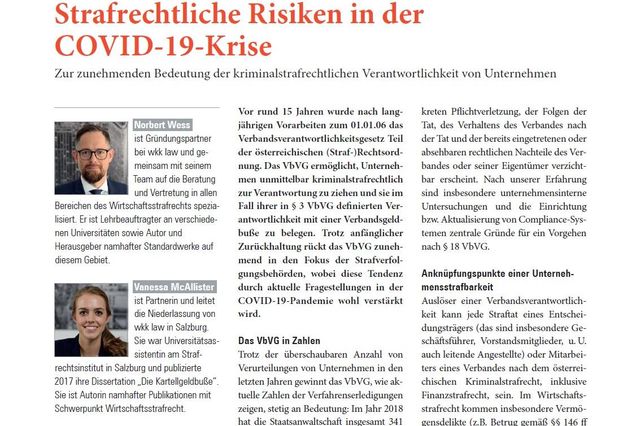Approximately 15 years ago, after many years of preparations, the Austrian Act on Corporate Criminal Liability ("Verbandsverantwortlichkeitsgesetz" - VbVG) became part of the Austrian (criminal) legal system on January 1, 2006. The Austrian VbVG enables law enforcement authorities to directly demand criminal prosecution of companies and to impose a fine on them in the case of their liability as defined in Section 3 of the Austrian VbVG. Despite initial caution, the Austrian VbVG is becoming increasingly more important to law enforcement authorities, a trend that is likely to be intensified as a result of current issues relating to the COVID 19 pandemic.
The VbVG in figures
Despite the modest number of convictions of companies in recent years, the VbVG is steadily gaining in importance, as current figures for case settlements show: In 2018, the Public Prosecutor's Office settled a total of 341 cases relating to the Austrian VbVG by means of termination of proceedings, diversion, criminal complaint or indictment; in 2012, it was just one-third (114). However, the low number of convictions compared to the large number of terminations is not surprising considering the prosecution discretion granted to law enforcement authorities pursuant to Section 18 VbVG: In fact, proceedings are not only terminated if there are no indications of liability on the part of the company, but Section 18 VbVG also allows termination of proceedings if sanctioning appears to be dispensable with regard to the specific breach of duty, the consequences of the offence, the conduct of the company after the offence was committed and the legal disadvantages already incurred or foreseeable for the company or its owners. In our experience, internal company investigations and establishing or updating compliance systems are particularly central reasons for proceedings pursuant to Section 18 VbVG.
Triggers for corporate criminal liability
Any criminal act - under Austrian criminal law and financial criminal law - committed by a decision-maker (in particular managing directors, members of the board of directors, and possibly also executives) or employees of a legal entity can trigger corporate criminal liabilities. In the field of commercial criminal law, property crimes (e.g. fraud pursuant to Sections 146 et seq. of the Austrian Criminal Code - "CC", falsification of financial statements pursuant to Section 163a of the Austrian CC), crimes against the environment (e.g. illegal disposal of hazardous waste pursuant to Sections 181b, 181c of the Austrian CC) or corruption crimes (such as offering benefits to a public official pursuant to Sections 306, 307b of the Austrian CC) are particularly relevant. In order to be assigned to the sphere of the company, the offence must either have been committed in favour of the company or the offence must have violated the company's obligations. Due to the broad interpretation of the term "in favour of the company", there are only a few cases in practice in which the act of a decision-maker or employee does not exhibit any of these characteristics in the course of his or her professional activities.
Corporate criminal law risks during the COVID-19 pandemic
The COVID-19 pandemic undoubtedly confronts companies with numerous challenges. As current experience shows, these even extend into corporate criminal law: a prominent example in media reports is the (alleged) abuse of Corona short-time work. Companies are suspected of falsifying work records in order to benefit from subsidies. In such cases, companies are not only threatened with consequences under financial criminal law (with regard to wage taxes or ancillary wage costs), but also with criminal liability for possibly qualified fraud (Sections 146 et seq of the Austrian CC). This can furthermore result in liability on the part of the company, since such actions generally result in favour of the company or violate the company's obligations. The current pandemic has also brought offences involving bodily injury and endangering the community into focus: If a company maintains its operations contrary to current regulations or without issuing appropriate internal protective regulations, and if this results in disseminating the SARS-CoV-2 pathogen, this conduct might be prosecuted as bodily injury (Section 83 et sec of the Austrian CC, Section 88 of the Austrian CC) or endangering humans through transmissible diseases (Section 178 et seq of the Austrian CC). It should be emphasized that even minor negligence is sufficient; the employer therefore does not need to have any positive knowledge that an employee has been infected.
Finally, in view of the economic implications of the COVID 19 pandemic, it should be noted that the creditor protection offences continue to apply unchanged, i.e., in particular, the extension of the maximum period for filing for insolvency from 60 to 120 days (Federal Law Gazette I No. 16/2020) has not entailed any change regarding the preconditions for criminal liability. Therefore, in the event of insolvency, no payments should be made to individual creditors (e.g. employees, social security institutions or tax authorities), because this conduct might be prosecuted as favouring a creditor (Section 158 of the Austrian CC). Even in the current crisis, business records must be kept accurately; the omission of such documentation may be qualified as a conduct that interferes with creditor demands within the meaning of Section 159 of the Austrian CC.
Summary
The current COVID-19 pandemic and its associated economic impact also pose risks from a criminal law perspective, both for the acting decision-makers and employees and for companies themselves. All the more reason, therefore, not only to carefully assess the economic situation of the company, but also to implement protective regulations when maintaining or reopening premises in order to avoid the spread of COVID-19 and an associated risk of criminal liability.
